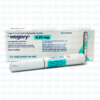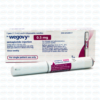The 2x Referral Bonus Event Is Now On! More Info ➡️
Home » Medication » Wegovy » Wegovy (Semaglutide) Injection
SAVE 10% OFF First Order With Coupon Code: WELCOME10





Our Price: $599.99

Wegovy (semaglutide) is a prescription medication designed for chronic weight management.
Buy Wegovy from Insulin Outlet and save even 55% on your next order!
Step 1
Place Your Prescribed Wegovy Dosage In Your Cart
Step 2
Complete Checkout
Step 3
Upload Your Wegovy Prescription
(Shipping takes approximately 4-10 business days. A tracking number will be provided)
Insulin Outlet offers a convenient and affordable way to access Wegovy. By sourcing directly from our reputable Canadian pharmacy, you benefit from significant discounts on this Health Canada-approved medication.
Enjoy the ease of home delivery, knowing your order is fulfilled with authentic medication and meets all regulatory standards. Place your order online or call 1-888-238-0872.
Wegovy (semaglutide) is prescribed to patients with weight management goals in mind.
It’s a once-weekly injectable medication specifically approved for use in adults with:
who also have at least one health issue linked to excess weight, like high blood pressure, type 2 diabetes, or elevated cholesterol.
Now, you can safely source Wegovy via our pharmacy network. Insulin Outlet is a licensed Canadian pharmacy aiming to provide a safe and reliable avenue for those seeking this medication, especially Americans who struggle with paying full price for it when buying domestically.
We’re a reputable Wegovy supplier – we gained thousands of positive reviews to back that statement up!
This medication is prescribed for:
By acting as a GLP-1 receptor agonist, Wegovy helps regulate blood sugar levels and other metabolic processes. This can contribute to improvements in overall metabolic health and in consequence, to sustainable weight loss.1
Wegovy is a glucagon-like peptide-1 (GLP-1) receptor agonist. This means it mimics a natural hormone in your body that helps regulate appetite, food intake, and blood sugar levels.
By activating GLP-1 receptors in the brain, it can increase feelings of fullness and reduce hunger, leading to decreased calorie intake and subsequent weight loss.
Wegovy is usually administered in weekly injections. However, you should always follow your doctor’s administering schedule.
Also, it’s important to learn how to inject Wegovy properly. If you don’t know how to administer the medication, ask your doctor or pharmacist to show you.
General Steps (Always refer to your specific instructions):
1. Preparation:
2. Needle Attachment:
3. Injection:
4. Disposal:
Wegovy is administered as a subcutaneous injection once a week.
It can be taken at any time of day, with or without meals.
It’s recommended to take it on the same day each week.
You can inject Wegovy in your stomach, thigh, or upper arm.
To avoid skin irritation, use a different injection spot each week.
Wegovy is supplied in a convenient, pre-filled pen.
Each pen is designed for single use.
It is very important to use a new needle with each injection.
Wegovy is available in the following dose strengths:
The typical Wegovy dosing schedule involves gradually increasing the dose over several weeks to minimize potential side effects. Here’s a general outline:
However, please note that your medical provider decides what dosage and administering schedule you should follow.
Your doctor may adjust the dosing schedule based on your individual response to the medication and any potential side effects you may experience.
There are certain considerations to take into account when administering or planning to begin treatment with Wegovy.
Wegovy, while effective for weight management, can cause a range of side effects. It’s important to be aware of both common and serious potential risks.
Common Side Effects:
Serious Side Effects:
It’s crucial to communicate any side effects you experience to your healthcare provider.
They offer guidance on managing side effects and can assess the need for treatment modifications.
There are also certain drug interactions you should be aware of when taking Wegovy. Some of these medications include:
| Feature | Wegovy (Semaglutide) | Other GLP-1 Receptor Agonists (e.g., Ozempic, Mounjaro, Saxenda) | Orlistat (Xenical, Alli) | Phentermine | Traditional Diet and Exercise | Bariatric Surgery |
|---|---|---|---|---|---|---|
| Mechanism of Action | GLP-1 receptor agonist, regulates appetite and blood sugar | Various GLP-1 receptor agonists, some with dual GIP action | Inhibits dietary fat absorption | Appetite suppressant (stimulant) | Calorie deficit through diet and increased physical activity | Reduces stomach size or alters digestive tract |
| Administration | Once-weekly injection | Varies: daily or weekly injections | Oral capsules with meals | Oral tablets, typically daily | Lifestyle changes | Surgical procedure |
| Typical Weight Loss | Significant (15% or more of body weight) | Significant, can vary between medications. Mounjaro has shown higher percentages in trials. | Moderate (5-10% of body weight) | Moderate to significant (short-term) | Variable, depends on adherence | Significant (15-30% or more of body weight) |
| Common Side Effects | Nausea, vomiting, diarrhea, constipation | Similar to Wegovy, can vary between medications | Gastrointestinal (oily stools, gas) | Increased heart rate, insomnia, anxiety | Variable, depends on diet and exercise | Surgical risk, nutritional deficiencies |
| Long-Term Use | Approved for chronic weight management | Only Saxenda is officially approved for chronic weight management | Can be used long-term | Short-term use recommended | Lifelong commitment | Long-term lifestyle changes required |
| Medical Supervision | Required | Required | Recommended | Required | Recommended | Required |
